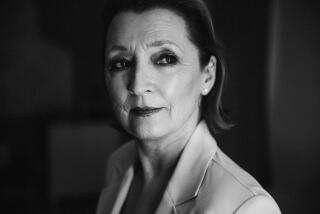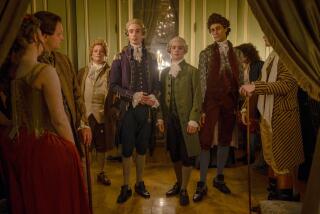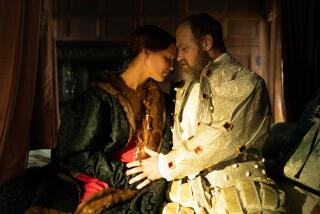Fashion statement
Dismiss your preconceptions about “The Duchess.” What you’ll remember most about this film is the duke.
That’s not to say that Keira Knightley doesn’t do quite well as Georgiana, Duchess of Devonshire, the 18th century “it” girl known as the Empress of Fashion, who lived a soap opera life centuries before soap operas even existed. “When she appeared, every eye was turned towards her,” a French diplomat reported. “When absent, she was the subject of universal conversation.”
In almost every scene, having to deal with hair as big as the Ritz (“People kept shouting ‘timber!’ as I walked past,” the actress reports) as well as 30 costumes so elaborate that her trailer had to be enlarged to contain them, Knightley manages all her challenges with admirable aplomb.
And it’s not that the film she’s in has anything to be embarrassed about, even if its poor-little-rich-girl story about the sad consequences of a loveless marriage among the rich and famous is as fully familiar as it sounds.
As directed by Saul Dibb (working from a script he co-wrote with the odd combination of “Casanova’s” Jeffrey Hatcher and Anders Thomas Jensen of Denmark’s marvelous “After the Wedding”), “The Duchess” is so handsomely done and so adroit at avoiding missteps that it’s hard not to be content.
Taking advantage of more than a decade spent directing documentaries in Britain, Dibb has brought a cool, matter-of-fact tone to what could have been overwrought material.
Yes, the film, impeccably shot by cinematographer Gyula Pados on location in a variety of British stately homes, is as handsomely mounted and beautifully costumed as anything you could ask for.
But Dibb has not seen any part of this setting as an impediment to trying to portray his characters as realistically as the sudsy story, based on Amanda Foreman’s biography, “Georgiana, Duchess of Devonshire,” allows.
Even surrounded by all this quality work, Ralph Fiennes, who plays William Cavendish, the fifth duke of Devonshire, the most powerful man in England next to the king, walks off with the picture.
We are introduced to the duchess before the world knew her, when she’s a lively teenager with a crush on handsome young Charles Grey (Dominic Cooper of “The History Boys”). Observing her from a window is the duke, taking a break from negotiations with her calculating mother, Lady Spencer (Charlotte Rampling). The duke needs an heir, hence, he needs a wife, and so the deal is made.
Informed of her impending marriage, Georgiana worries like any 17-year-old about whether the duke loves her. That emotion, she discovers after the wedding, is not in her husband’s vocabulary. Distant, unconcerned, a stranger to both conversation and emotions except where his dogs are involved, the much older duke considers himself the prime mover, someone who acts while others must react.
Though initially overawed by her new situation, the duchess gradually compensates by having a witty and ultra-fashionable public life, befriending Whig politicians like Charles Fox (Simon McBurney) and his young protege Charles Grey (yes, that Charles Grey), as well as playwright Richard Brinsley Sheridan, who eventually writes “The School for Scandal” about her marriage.
Greatly in need of personal warmth and gradually even further estranged from the duke because their marriage has produced daughters rather than sons, Georgiana befriends Lady Bess Foster (Hayley Atwell), a fetching divorcee. Bess is in such dire straits that Georgiana asks if her new friend can move in with them. Any soap opera viewer could give you a rough idea where this is going, although an added wrinkle is the film’s emphasis on the awful powerlessness of women in 18th century society.
The duke ought to be the villain of this piece, and, in fact, he is, but it is the wonder of Fiennes’ performance that it is not only a marvelous portrayal of absolute power in the flesh but also the most sympathetic portrait of a man who, by rights, shouldn’t have even the tiniest drop of our regard.
Twice Oscar-nominated (for “Schindler’s List” and “The English Patient”), Fiennes works in the subtlest ways, layering in everything from how he carries himself to the way unstated emotions are hinted at by his stone-like face, to present someone who can’t help being who he is. Thanks to Fiennes, we come to understand the enigmatic duke as the immovable object deeply perplexed at having to contend with the unstoppable force that is his wife. It is a quietly complex performance almost beyond words, and it overshadows all the gorgeous pictures that are its elegant frame.
--
“The Duchess.” MPAA rating: PG-13 for sexual content, brief nudity and thematic material. Running time: 1 hour, 45 minutes. In general release.
More to Read
Only good movies
Get the Indie Focus newsletter, Mark Olsen's weekly guide to the world of cinema.
You may occasionally receive promotional content from the Los Angeles Times.











